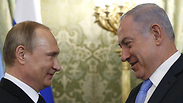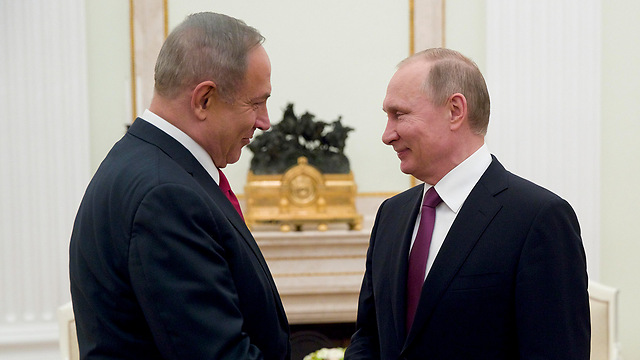
Putin and Netanyahu meet in Moscow
צילום: AP
With friends like Putin and Trump, Israel doesn't need enemies
Op-ed: Israel set clear red lines in Syria, stopping numerous Iranian arms convoys from reaching Hezbollah. But what is Israel going to do when the Russians and Americans finalize an agreement to end the war in Syria, which would allow Tehran to establish itself in the Golan and put its soldiers right on our border?
Prime Minister Netanyahu often boasts about his close relationship with his friends Russian President Putin and US President Trump—but what do we actually get from the close ties with these friends, whom Netanyahu is mostly trying not to anger?
Netanyahu, his office told us, was on his way to the Russian resort city of Sochi to meet with Putin and discuss with him Israel's concerns of the agreement taking shape between the Americans and the Russians to end the civil war in Syria, which is expected to leave Assad in power and aid the interests of Iran, Hezbollah and the Shiite militias.
In fact, after all of those coordination meetings and talks in recent years between Netanyahu and Putin, Israel is expected to find itself under the threat of the Iranian Revolutionary Guard Corps, who will be stationed right on the border in the Golan Heights. On its doorstep Israeli will be facing the threat of new rockets that would be manufactured at the factory Iran has built near Aleppo, which will be given to Hezbollah. It will be facing the threat of thousands of fighters from Afghan and Pakistani Shiite militias.
This begs the question of how Israel is going to ensure its vital interests in this New Middle East, in which the controlling players are Russia and Iran.
Netanyahu is not expected to get help from his friend Trump—the US under his presidency has no presence in the civil war in Syria, nor does it show any particular interest in aiding its allies. While the Americans did deliver a blow to Syrian regime targets after Assad used chemical weapons, all Trump is really doing is continuing his predecessor Obama's policy: Limited involvement in conflict zones.
And so for all the red lines Israel has set, it stands alone in defending them. During the fighting in Syria, Israel made it clear any Iranian attempt to transfer missiles and other weapons to Hezbollah would be met with a harsh response. Outgoing Air Force commander Amir Eshel even revealed IAF fighter jets carried out over a hundred airstrikes, destroying weapons convoys en route to Lebanon.
These strikes in recent years were made possible thanks to coordination protocols developed by the IDF and the Russian army in an effort to avoid misunderstandings and clashes. These coordination protocols have proven themselves to be effective. But what will Israel do when the Iranians consolidate their control of the area? Will Netanyahu set new red lines?
Sandy Berger, the US national security advisor in the Clinton administration, used to say the problem with the Israelis was that any red line they declare quickly fades into a pink line.
And so, Netanyahu might also discover his red lines are losing their potency in light of the new balance of power his good friend Putin is establishing in the area along with the Iranians. And this will be the prelude to an entirely different chapter in the tumultuous story of Israel's efforts to neutralize the Iranian threat.











